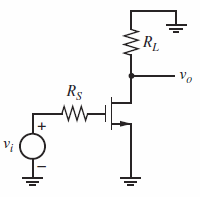(a) Use zero-value time constants to estimate the dominant pole and short-circuit time constants to estimate the...
Question:
(b) Compare your answers with a SPICE simulation.
Data from Prob. 7.2:
Repeat Problem 7.1 for the MOS common source stage shown in Fig. 7.2b using RS = 10 kΩ, RL = 5 kΩ, ID = 0.5 mA, and the following NMOS transistor data: NMOS: W = 100 µm, Ldrwn = 2 µm, Ld = 0.2 µm, Xd = 0, λ = 0, k€™n = 60 µA/V2, γ = 0, Csb = Cdb = 0, Cox = 0.7 fF/(µm2), and Cgd = 14 fF.
Data from Prob. 7.1:
(a) Use the Miller approximation to calculate the ˆ’3-dB frequency of the small-signal voltage gain of a common-emitter transistor stage as shown in Fig. 7.2a using RS = 5 kΩ, RL = 3 kΩ, and the following transistor parameters: rb = 300 Ω, IC = 0.5 mA, β = 200, fT = 500 MHz (at IC = 0.5 mA), Cμ = 0.3 pF, Ccs = 0, and VA = ˆž.
(b) Calculate the nondominant pole magnitude for the circuit in (a). Compare your answer with a SPICE simulation.
Fig. 7.2 (b)

Step by Step Answer:

Analysis and Design of Analog Integrated Circuits
ISBN: 978-0470245996
5th edition
Authors: Paul R. Gray, Paul J. Hurst Stephen H. Lewis, Robert G. Meyer





